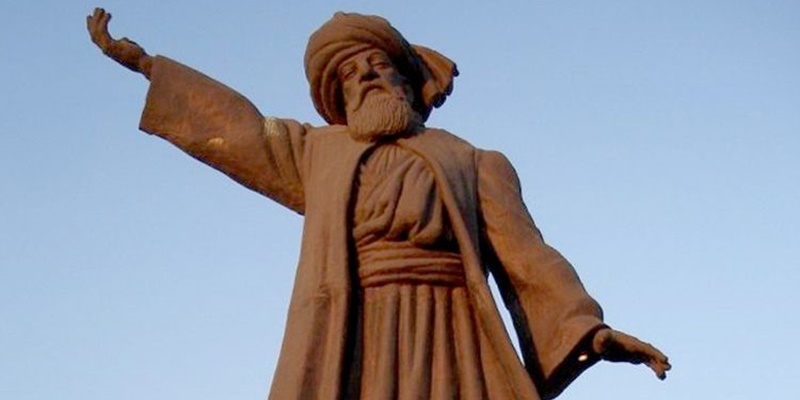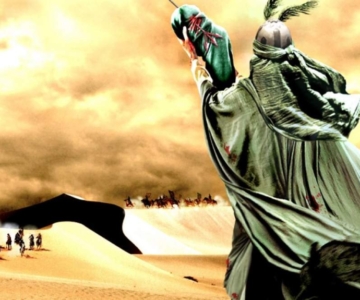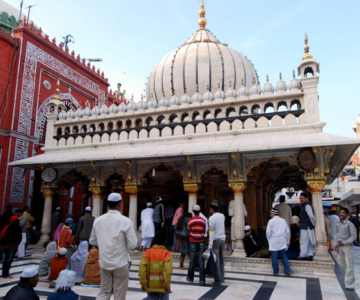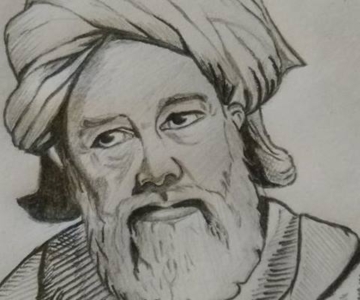An Interview with Seyyed Hossein Nasr on Islam’s Spiritual Science in the Modern Age
By WAJAHAT ALI
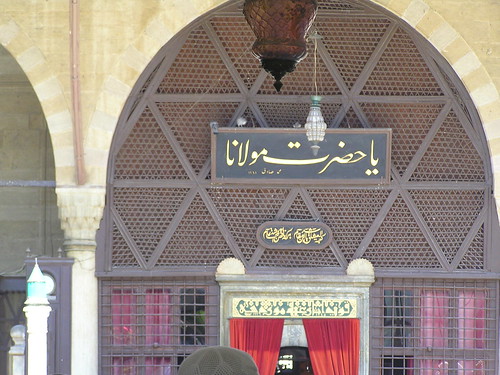
Rumi, the best selling poet in America today, was a practicing Muslim and a Sufi master who lived nearly eight hundred years ago. His poetry and lyrical verses exalting his desire for the Divine, as well as describing his ecstatic pain and yearning for his “beloved,” continue to inspire lovers to this day. Due to mass commercialization and weak translations of Rumi’s poetry, Sufism has unfortunately become synonymous with a saccharine, Hallmark card, Deepak Chopra’d simplification of Islam’s most profound spiritual science. Even within the global Muslim community, significant controversies and acrimonious debates have arisen around the validity of Sufism within the theological framework of the religion. Many, such as Seyyed Hossein Nasr, one of the most prolific and well known Muslim American scholars, argue that Sufism represents the spiritual engine and heart of Islam, which is rooted within the core of its scholastic traditions, and is capable of revitalizing modern day Islam rooted in literalism and political extremism. In discussing his latest work, “The Garden of Truth: The Vision and Promise of Sufism, Islam’s Mystical Tradition,” we talked about Rumi’s spiritual influence on the modern world, the role of Sufism in Islamic history and tradition, and the critique of Sufism as an antiquated model of esotericism.
ALI: Let’s talk about Rumi. I’m sure you know Coleman Barks [“Translator” of countless Rumi poetry books], correct?
NASR: Yes.
ALI: Even though Coleman Barks and others try to divorce Rumi from his God consciousness, it nonetheless emanates in his poetry. Rumi is the best selling poet in America today. What is it about his work, which is thoroughly rooted in Islam and Islamic sciences, that appeals to mainstream audiences?
NASR: The question I think should be put the other way around. First of all, Jalaluddin Rumi is completely rooted in Islamic teachings of Quran. He was a great scholar, he belonged to a madrassa, and he knew Islamic theology and jurisprudence very well. He knew Persian, Arabic and Turkish, which was coming into Anatolia at that time, very well. He was a remarkable, remarkable scholar, besides being a great saint. He was completely rooted in Islamic tradition. I’m totally opposed to those who try to pull Rumi out of his Islamic foundations by ignoring that element. I have written about this quite a bit and in fact I have a recent book of poetry which is called “Life is a pilgrimage: In conversation with Rumi” in which I translated the first part of his Mathanvi [Rumi’s most beloved work.]
It complements what I said about Rumi being rooted completely in the Sufi Islamic tradition. Now what is it that appeals universally of Rumi to the West today? Several things. First of all, Rumi is one of the great spokesmen for the Quranic instruction teaching that all prophets come from God and God does not create one religion, but many religions. The verse of the Quran that mentions we have created for each of you, for all of you, your own path, your own Sharia [Religious law], so that you will vie for each other in goodness and mindfulness of God. And a very famous Quranic verse: “To every people we have sent a messenger.” And many of the verses of the Quran which represent a universal perspective of Islamic Fiqh [Jurisprudence.] Abraham is called a Muslim, Christ is called Muslim. Now, there were a large number of Muslims throughout history who brought out the meanings of this especially when it was necessary; when Islam met Hinduism in India and in Anatolia for example, and when Islam met Christianity and to an extent Judaism. But Rumi is one of the great masters who brought out this universal teaching.
As of today, one of the greatest problems of humanity is how to live in a multi religious society without losing one’s religion – without relativising everything. Which is why perhaps with the greatest spiritual problem of today, Rumi is a great master who is able to provide a way. Secondly, Rumi is also perhaps the greatest mystical poet who ever lived, one of the greatest poets of the Persian language. He was able to express practically all aspects of the spiritual life and our existential situation in the world today as human beings in beautiful Persian poetry.
Now, Coleman Barks and these other translators who are very famous now, they do not know Persian. They work with a Persian speaker. The translations are not exact. They are not like the translations of Reynald A. Nicholson, who translated the whole of the Mathnavi, a remarkable feat; a few mistakes in it, but really a remarkable feat. These people have adapted the teachings of Rumi often based on the Nicholson translation often with the help of a Persian speaker to a kind of contemporary, American medium of poetry. This is quite an art, although it’s not exact from the point of scholarship, it brings out something of the taste for this combination of truth and beauty that Rumi represents: an expression of the deepest truths of spiritual life in God and beauty.
ALI: Speaking about Rumi and other Sufi poets, much of their poetry comes from a specific desire. There seems to be a fire and longing in their spirit that was ignited by a loss. For Rumi, it was the loss of his spiritual friend and guide Shams Tabris. Why do we see these extreme emotions: one of pain and longing and the other of love, both equally necessary in reaching and understanding the Divine Path? Why the marriage of pain and longing?
NASR: Well, that’s very obvious and let me give you a human example. If you’re just a young man, like you are, and going about your business, you will think of this. Suppose you fall in love with a girl, now suddenly this element of love comes into your life and it disturbs you. The day before you fell in love, you got up in the morning, you said your prayers, you washed yourself, and you went to work and didn’t think of these things.
Then suddenly you’ve fallen in love. Once you’ve fallen in love, it’s turned around your whole life. You keep thinking bout this girl all the time instead of thinking about other things. Since the object of love is that particular person, being separated brings about a longing and pain. Love is loss combined with pain; even in the West you have the famous, famous play, which Wagner put into opera, Tristan and Isolde, which brings out the story of these great lovers, where their love leads to death. It’s one of the most famous arias of Western music – The Love-Death Song of Wagner in German – which corresponds exactly on an external plane, because of course Wagner was not a mystic or a Sufi, but it was a medieval story that had this depth in it. The idea that love itself cannot be divorced from the suffering which comes from being separated from the object of love. The story of Layla and Majnoon, in Arabic and Persian and other Islamic languages, always leads them to death. It’s like Romeo and Juliet: intense love. This is a human way for expressing something much more profound that is that love for God.
And the Quran, of course, speaks about this explicitly: “God loves them, and they love Him.” If God did not love us, we could not love him. And Sufis are those who have realized this love. It’s like that second day that I mentioned about a young man, like yourself. The first day he was not in love and went about his business, and the second day suddenly the love came. There are people who realize this love for God in this life. Like falling in love with a beautiful woman, or from a female side, a man. Once this realization takes place, this love brings with it yearning. Yearning is inseparable from love, and since once doesn’t have the object of love immediately, one has not fallen in the embrace of the beloved immediately, they are suffering. That’s how they are related.
ALI; Here’s a criticism that many critics of spirituality ask: If the spiritual seeker must be like a subservient “corpse” in the hand of his “washer”, his spiritual guide, then doesn’t Islam and the spiritual path rob one of their individuality? Isn’t this proof Islam is a machine that requires assimilation and creates mindless automons? How is this a path towards individuality?
NASR: I wish someone could get rid of individuality so easily; one never gets rid of one’s individuality completely. One gets rid of one’s egotism, which is a very different matter. In your room, you can have two paintings on your wall; one that is a Persian miniature and the other which is a Dutch painting by Rembrandt. They are very distinct characters, yet they have their own individual traits, but they are inanimate, they don’t have a will of their own. When one talks about being like a dead corpse in the hands of a spiritual teacher it means being able to surrender one’s will, specially one’s nafs al ammarah, that is a part of our soul which is again a Quranic term, which commands us to evil – we must surrender that. That’s what it means. It doesn’t make you become part of a cog of a machine.
In fact, the machine doesn’t have the consciousness we have, the free will that we have, and to surrender one’s free will, not in every matter but in spiritual matters, to a spiritual teacher is in a sense a lower level of surrendering one’s will to God. Many people have criticized Islam for being just automatic, having no individuality, just surrendering your will to God, but we Muslims know very well that every moment of the day we have to practice the fact that to surrender one’s self to God is an act of free will.
ALI: Muslims look at the world right now, specifically the Muslim “ummah” [community], and they see instability, suffering, authoritarian regimes, oppression and so forth. So, many Muslims ask what will all this fasting, this dhikr [remembrance and invocation of God], this tazkiyat al nafs [Spiritual exercises in purification], and all this Sufi practice help? How do all these spiritual Sufi practices help the Muslims suffering in Palestine, Chechnya or Iraq? People say this is like Muslims who live in a bubble and put their heads in the sand, but in order to help people one must be more political. So, what’s your take on that?
NASR: It’s total nonsense. There are many, many answers to this question. The main answer is that the Islamic world is suffering not only because of external oppression but also because of the loss of its own dignity, of its own heritage, of its own practice of Islam, of its weakening of its own ethics, and many things which are internal to Islam not just external. Now, Sufism has always had the function of purifying Islamic ethics and that fasting and tazkiya is like lighting a lamp. What does a lamp do? The lamp is like a horse that is running but stays put. But by virtue of being a lamp it illuminates the space around it. Therefore, the practice of purifying one’s soul, of living virtuously, has tremendous impacts upon the ethics of the surrounding society.
The Islamic world is not only suffering from the American occupation of Palestine and Iraq, it’s also suffering from the unbelievable corruption in Afghanistan by Afghans themselves and also in Iraq – I’m just giving these 2 examples of countries which are under direct occupation; I do not mean at all to negate the terrible events that led to this or what’s going on with the foreign occupation there. But I’m saying that it is not the only problem and Sufis have always been those that have tried to purify the ethics of Islam and society. And they don’t have their hands cut off from the external action at all. For example, the bazaar in which the Sufis were very strong always dominated economic life in Islamic world. They could give a much more sane and Islamic form of activity when the economic life of Islam moved out of the bazaar to new parts of Islamic cities with modernized Muslims, who took it in another light and it became very, very anti Islamic, and much against many of the most profound practices of Islamic societies.
There is no way throughout Islamic society for Islam as a society, as a civilization, to revive itself without this inner spiritual vitality that came to it. And also militarily, the great movements of resistance against colonial powers in the 18th and 19th century were almost all from Sufis: Imam Shamil in Caucasia, Amir Abd al Qadir in Algeria, The Barelvi family in the modern province of India, today which is Pakistan, and you can go down the line. What is tragic today is that there is a number of Muslims who think that all the solutions are to be found simply by external actions. They don’t have to do anything within themselves. This is a deeply Western idea – modern, Western idea, where you try to improve the world without improving yourself. And this is what the Muslims who talk about others putting their heads in the sand and that “We are doing jihad and we are political” and so forth, they are emulating a very important mistake of modernism.
ALI: Prophet Muhammad’s personality and name are exalted as habiballah, beloved of God, and he who is beloved by Muslims as a criterion model of conduct. His Sunnah [Prophetic etiquette and conduct] yields men like Rumi and leads to acts of selfless charity, but also at the same inspires jihadists and extremists in the modern world. Many people blame this latter type of behavior on the personality of Prophet Muhammad. Let’s talk about this remarkably complex personality, which can produce such varying fruits and results in its followers. You have the Sufis on one hand and the Bin Ladens on the other.
NASR: First of all, The Bin Ladens must not be confused with authentic jihad – it’s quite something else. If you want an example of external jihad, you should cite Amir Abd al Qadir who fought against the French in the 19th century, which was quite something else. But putting that aside, the Prophet, peace be on him, presents all the possibilities of the human state in perfection. Now, a part of that of course is love of God. And the word Habib in Arabic means both lover and beloved. At the heart of it is that he loves God, God loves him. But God designated him to be also the founder of a new world order of a civilization of a society. He was therefore, first of all, a Prophet of course, a beloved and lover of God, a father, an army commander, a judge, a ruler of a community, the King of Medina and later of Arabia, and all of these were combined in him and his destiny, the reason God brought him on earth, was to show how each of the functions which human beings have in life have the perfect form in the prophet.
He sets the model for all of them. He sets the model for being a good statesman. He also sets the model for being a good warrior, for chivalry, of nobility, of all the things which the Quran and Hadith [The recorded collections of the sayings and traditions of the Prophet] says of treating your enemy with dignity and kindness. The Quran explicitly opposes the killing of innocent people and the Prophet was always careful in doing that. If they had to fight a war, he was always on the side of peace as soon as it was possible to make peace because that’s what the Quran says also. He was the exemplar ruler, exemplar father, exemplar warrior, and once you have a family, you have contentions, you have problems, human problems, and it’s the human order. He set the example and model for Muslims for all the different endeavors. He is not only the example of the spiritual life, but he is also an example for our life in this world. Because Islam, in contrast to Christianity and Buddhism, does not have monasticism; spiritual life, social life, they are all integrated and related together in one way or another. And the Prophet represents that in his life.
ALI: Let’s talk about the relationship between a murshid [spiritual master/guide] and his murid [spiritual aspirant/apprentice]; the seeker and the sought; the master and the apprentice. First, why must the spiritual aspirant need to give baya’ [allegiance/oath; giving one’s hand] to a spiritual master?
NASR: In Islam, there is no priesthood and each person stands before God, like in the daily prayers, without an intermediary. That’s in contrast to Christianity, where during the Eucharist, a priest has to officiate and the priest functions as a link – at least in Catholic Christianity – between the laity and God. In Islam this doesn’t exist. However, this is not the same thing as spiritual guidance of what I speak. All Muslims stand before God and they are their own priests. But spiritual guidance needs guidance. It’s like comparing walking on the ground and mountain climbing. Once you learn how to walk, you can walk on the ground by yourself, but if you want to climb Mount Everest, you need a guide.
The fact there is need for a guide in the spiritual traveling that Sufism is involved with does not at all annul what I just said about the lack of necessity of an intermediary of God -as far as religious rights of ordinary practices of religion are concerned. In the field of medicine, if you’re sick you need a doctor. A doctor has already studied how to deal with your ailments, and human beings are imperfect. There any many ailments of the psyche and the soul that need to be treated, and the serious murshid, or spiritual master, is also really a doctor of the soul: a person who can heal the wounds of the soul in the same way as a medical doctor takes care of our physical problems. Why does one need a doctor if God has given us our body and we pray to Him for our help?
That’s on one level, but the need of a doctor when we have a bad stomach is an immediate level and God has provided the possibility.In Islam, we believe that it is God himself who is the ultimate guide – Al Hadi – one of the names of God is Al Hadi, the Guide. But at the same time, God has provided within the Islamic revelation the possibility of spiritual guidance through human beings, because then everyone can have direct access to God. If you want to make a decision in life on what to do, but if you’re trying systematically, through spiritual practice, through meditation, through the invocation of the name of God, to walk closer and closer in this life to Him, you need someone to guide you. And God has made it possible in Islam for this guidance to exist.
ALI: Here comes the criticism, and I don’t want to label the people who would say this, but assume someone says, “Ok, what you say makes sense but where’s the proof in Quran and Sunnah [The Prophetic traditions and etiquette] that allows this? Where did the Prophet Muhammad allow this? When did Prophet Muhammad do this – the giving of the baya’?”
NASR: First of all, in Hudaibiya, the Prophet gave baya’ to his choice followers, laying the foundation of the baya’ of Sufism. This is based directly on the Sunnah of the Prophet. Secondly, the Quran mentions the story of Moses and Khidr [a prophet mentioned in the Quran who guided Moses on a revelatory journey], a famous story, in which Moses represents sort of the external understanding of the religion and Khidr represents the inner spiritual understanding of the religion. Moses went on a journey with Khidr and Khidr said, “I will not accept you unless you stop questioning things,” which from an external point of view seems strange, but inwardly is very meaningful. This is exactly the question of spiritual guidance.
Finally, you have the prototype of spiritual guidance, you have the Prophet, peace be upon him, himself when he goes on the night Miraj, the nocturnal ascent, which is in the Quran and no Muslim can deny it no matter how external and exclusive they are, and there are many of those in the Islamic world today, but they can’t deny the text of the Quran. The Prophet was taken by the order of God to heaven, which is a prototype of all spiritual realization in Islam. But, he had a guide; Gabriel, the angel, was his guide. He took him to heaven. So, anybody who says what is the basis of this – there are many, many sources. This is not at all something without scriptural basis; there is much scriptural basis in Sharia [Islamic Jurisprudence.]
ALI: Many might say what you are describing is a very universal concept of religion and spirituality. Yet in Sufism and Islam, why is Haqiqat [Spiritual Enlightenment; The Ultimate Truth] rooted within Sharia [Islamic Jurisprudence]? Why must the tariqah [Spiritual Path] be Islamic if there are so many different paths to God?
NASR: That’s a very good question. In the same way that we have a body and a soul and a spirit, our soul can’t walk in the street without our body – we would be dead then. Religion is the same way; it has to have a body, it has to have a form, it has to have structure. Without that, the soul cannot be prepared to follow the tariqah. Tariqah [The Spiritual Path] without the Sharia [Islamic Law] is like having a pistachio tree without the shell. Or a walnut, a walnut cannot grow on a tree without having a shell, and the food that you eat is inside the shell. The Shariah has many other functions but also protects the tarqiah; it protects the spiritual path. There is no religion in the world where there is a possibility of spiritual development outside of the context of that religion. This is only a modern invention. For example, Christian mystics were also Christians. They also went to Church and followed Christian laws. Hindu mystics were practicing Hindus; they didn’t kill cows and have steak. They follow the Hindu laws and so on and so forth down the line and Sufism is no exception.
It’s only in the modern world, where there is a hatred of religion, and there are certain sectors of modern society where there is an idea that you can take the spiritual teachings of a religion outside of a religion and practice them; these ideas are brought forward. That appears to be easy. You can say, “Oh, well. I don’t have to bother about not eating pork, and not drinking wine, and all you have to do is read the beautiful poetry of Rumi and talk about wine, women and song. Or something like that.” This kind of attitude. This is the antipode of the other attitude which says Islam is nothing but throwing bombs, it has nothing to do with internal or inward purification.
ALI: Haqiqat, some say, destroyed al-Hallaj [9TH century Persian Sufi mystic executed for alleged heresy] It overtook him to the point where he exceeded Sharia boundaries and proclaimed himself as “The Truth.”So why dabble with something that is so dangerous for a practicing Muslim? Why dabble with this spiritual science?
NASR: You are taking only one case. It’s like saying why drive when there are drunk people on the road everyday. There are millions and millions of Sufis who have existed in Islamic history and have the deepest impact on every aspect of Islamic culture and civilization to philosophy to art to science to social structure to economics who have not met the destiny of al-Hallaj. That has to be understood.
Al-Hallaj has a special destiny. He came at a time when worldliness, the luxury, were inundating the Islamic world. His function was to act as kind of an antithesis to this, and he paid for it with his life, and he was very happy to do so.He smiled as he went to the executioner. That was done because it shook the conscience of the Islamic peoples of that time. But the vast majority, the vast, vast, vast majority of Sufis, they have not met the destiny of al-Hallaj. They have spoken about reaching “the Truth” and there is nothing dangerous about it. Look at Senegal, about 90% of the Muslims in Senegal are Tijani or Qadiri Sufis. Among them, they have very great teachers who have written poems about al-Hallaj, and they have not been killed. In fact, it’s Sufism that brought Islam through all of Senegal, right under our noses the last couple of centuries. And you can go down the same line through Indonesia and Malaysia. How did the Turks become Muslim? They became Muslim through the Sufis. The Arabs never conquered the Turks. There were people in early Islam who were speaking like Hallaj, who spoke about the Truth, about reaching the Truth, about being one with the Truth, and not only they were not killed, but they were great heroes of their own culture, and there is a university in Turkey named after one [Sufi Saint.]
ALI: How did Sufism help spread Islam without the sword using the Chishti and Qadiri Sufi tariqahs in South Asia? Because all we hear is that Islam spread through the sword and only the sword –
NASR: That is absurd. This is all Western propaganda from the Middle Ages which is totally untrue. First of all, 300 years after the rise of Islam there were Zoroastrians in Iran. The Muslim armies never forced people to accept Islam. It was only within Arabia that God ordered the idolaters to have a choice of either embracing Islam or fight against Muslims, because He wanted to remove this terrible idolatry that exited there. But outside Arabia where Islam met Christians, Jews, Zoroastrians and Hindus, they were given a choice by and large. That’s why many Christians and Jewish communities survived in the Muslim world, but gradually many of them embraced Islam for different reasons. First of all, let’s stop talking about the spread by the sword. The Islamic world doesn’t stop in the Arab world or Persia. There is the whole Turkic world, the Central Asian world, South Asian world, Southeast Asian world, and African world.
If you have a billion Muslims, 900 million of them were not brought into Islam by any kind of invasion, but most of them through the Sufis, because human beings are such that they are affected by people of spiritual character. Certainly when they display nobility and hospitality and gentility and love and are not selfish or aggressive, and they are honest.People who were also traders were also men of Sufism, as we see around Java, people who were outwardly trading but were also men of very high spiritual character. Otherwise no trader would be able to convert a person from one religion to another. It was because they were men of spiritual character.
The Qadiri and Chishti Sufi orders in South Asia played an incredible role. Moinuddin Chishti, this incredible master who founded the Chishti order, originally Chisht was in the border of modern day Afghanistan and Pakistan, he was brought to India as a young man. He was a great saint. Openly, Hindus came to him, he would pray for them, he would be kind to them, and he would eat with them. Many of these Hindus realized this man was beyond all the distinctions of caste and social classifications that existed in India. I’m not trying to criticize the caste system that has its own philosophy, but the oppressive aspect of social stratification did not exist for him, so, many Hindus came to him. And they say he brought over 500,000 people to Islam during his life. Same with the Qadiris, some of these were great teachers who did not take a sword and try to fight against the Hindus. They made friends with the Hindus. In fact many Hindu yogis and Sufis met, they became friends, they spoke about the knowledge and love of God; about all the similarities that exist. And then the simplicity of Islam, the fact these people practiced what they preached brought many, many Hindus into Islam. It is very clear, you can see it: without Sufism, Islam would not have spread into two thirds of what we call the Islamic world.
Wajahat Ali is a playwright, essayist, humorist, and Attorney at Law.
